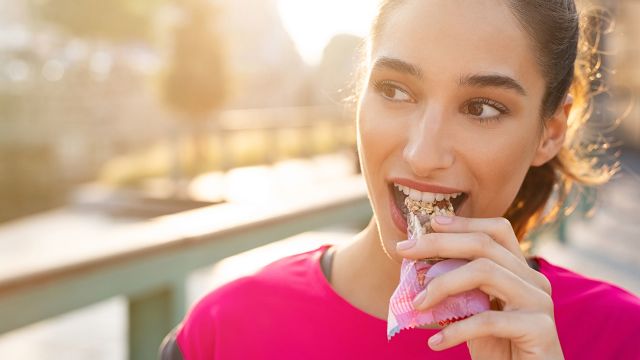Updated on August 4, 2023.
Are you getting the nutrients you need to power through your exercise routine? Or do you sometimes feel like you're running on empty? Just like an automobile, your body will perform more smoothly and efficiently given the right type of fuel and the proper fluid levels.
So, if you find yourself huffing and puffing to make it through the final mile of your run or if you simply want to feel better when you exercise, take a closer look at what you're offering your body as sustenance. Are you giving yourself the high-octane, performance-enhancing fuel it deserves?
The following quiz can clue you in to whether your diet is making exercise more difficult and, if so, what changes you need to make to power yourself up.
1. To maintain an active lifestyle, where should you get most of your daily calories?
a. Carbohydrates
b. Proteins
c. Fats
The correct answer is:
Carbohydrates: Carbs are the body's main source of energy and an important part of a healthful diet. They help keep you energized by maintaining blood sugar levels and play a key role in helping your body recover after exercise. Try to get 50 to 65 percent of your calories from carbohydrates.
Most people get enough carbs from their regular diet, but they may not be the best kind. For healthy amounts of beneficial carbohydrates, choose fresh fruits, root vegetables (carrots, beets, sweet potatoes, for example), and whole-grain products, such as brown rice, barley, and whole wheat bread.
2. To stay healthy and fit, it's best to eat a strict low-fat diet.
a. True
b. False
The correct answer is:
False: Your body needs fat. And research suggests there's no health or fitness benefit to restricting your fat intake to less than 15 percent of your daily calories.
In addition, fats provide essential fatty acids and vitamins. So, aim to get 25 percent to 35 percent of your calories from healthy fats—preferably the heart-healthy unsaturated fats that come from foods like fish, olive oil, nuts, and avocados.
3. You're about to start your 45-minute evening circuit-training class. What snack should you grab?
a. That's easy: a protein bar
b. The candy bar I keep in the glove compartment for emergencies
c. A handful of trail mix or a granola bar
d. A meatball sub from the corner deli
The correct answer is:
A handful of trail mix or a granola bar: A good source of healthy, energy-boosting complex carbohydrates, trail mixes and granola bars also are typically easily digested. And they have a little bit of fat and protein for slow-release energy, making them the perfect snack to sustain you through a medium-length, high-intensity workout.
The bottom line
You know that what you eat affects your overall health, and that some foods are better for you than others. It's no different when you're eating for exercise. In fact, if you focus on a balanced diet and keep your blood sugar levels steady by having healthful meals and nutritious snacks throughout the day, you probably already have a good energy store for your workout.
Your main goal is to get the right amount of energy—quick release, slow release, or both—to power you through your routine. It’s also important to get enough water to replace the fluids you lose through sweating. And last but not least, you’ll need to refuel after your workout.






